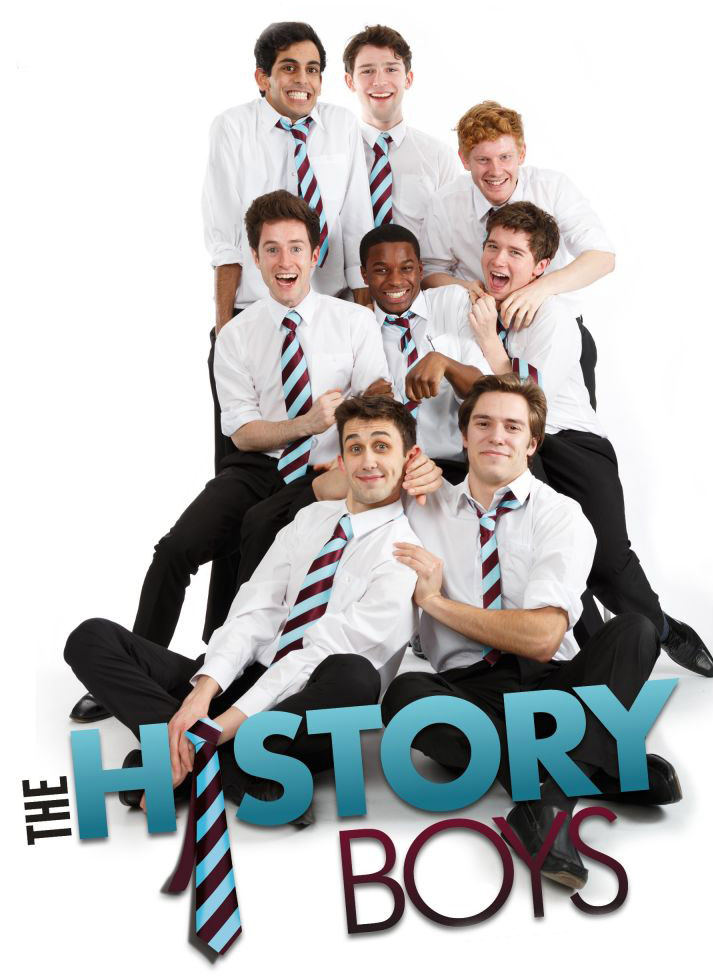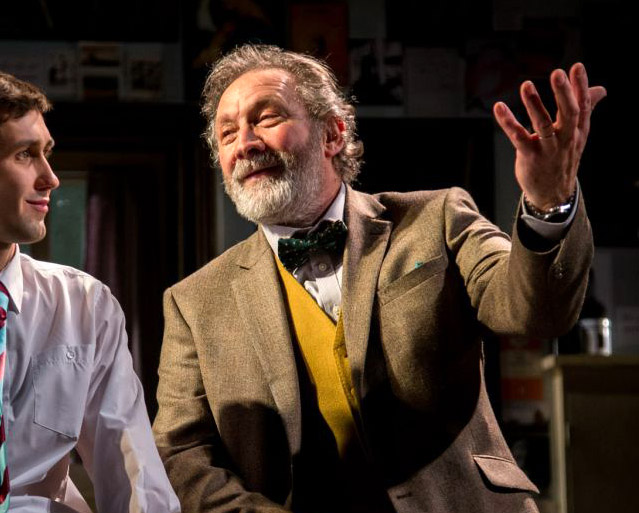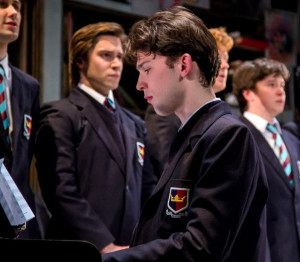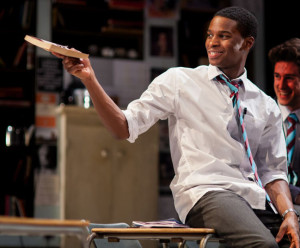StageTalk Magazine’s Will Amott spent a day with The History Boys company in Birmingham at the start of their nationwide tour. He talked extensively and exclusively to three of them. . .
Richard Hope has been a familiar and accomplished actor on stage, screen and radio for almost four decades. He is now appearing as Hector in The History Boys tour. He is joined on stage by Alex Hope (Scripps), a recent graduate from Royal Welsh College of Music and Drama, and Kedar Williams-Stirling (Dakin), one of the stars of CBBC’s Wolfblood. I spoke to all three in the Alexandra Theatre, Birmingham after their first night.
StageTalk: How was your first night?
Alex Hope: It was good. This is the biggest theatre I have performed in, so it was quite daunting, but they didn’t have all three decks on for the first night. If that had happened, well, a little bit of wee might have come out. It’s a great theatre. Everyone’s so close that it’s easy to gauge reaction and, for this play specifically, especially when you get towards the end and you have to do—like I do—the narrative speech about Hector dying, gauging what the audience has previously given is key for that. So far the audiences have been absolutely on point. If they’ve not been crying with laughter, they’ve been listening, and that’s so important for this play, because it’s about language.
StageTalk: How’s the experience of rehearsals been?
Richard Hope: Very good. Brilliant director. I hadn’t met Kate Saxon before, so to me, she was a first time, young director… very good. I work a lot better with a director [when] let loose.
AH: It’s quite a running joke now that the teachers are more badly behaved than the boys.
Kedar Williams-Stirling: Yeah, good. Tough. It’s an experience that I’m really, really enjoying, to be honest. I haven’t done a role like this before. Being in a group of boys going in for Oxbridge exams, and being Northern. It’s been a quick turnover. We’ve had to do a lot of research.
StageTalk: Was that off your own back?
KWS: A bit of both. Kate’s been quite adamant that we do know what we’re talking about. We had a whole library that was provided, with Phillip Larkin, Walt Whitman, and stuff. It just make more sense.
StageTalk: To what extent does the play relate to your own school experience?
RH: For me, when I was at school, this sort of system did operate. I think it ended in ’83. What used to happen, anyone going to Oxford or Cambridge stayed on at their school for an extra term. This was an elite group of boys, or girls, or mixed, who stayed behind and were just studying extra stuff. They had crammed education. They were always reading and they were kept separately, you know, and school rules for them sort of went out of the window a little bit. It was interesting to see that.
KWS: I went to performing arts school. I just graduated from Italia Conti and before that I was at Sylvia Young. I missed the whole grammar school, education-is-all-it-is thing, do you know what I mean? That whole thing. But teachers like Hector, I did experience to an extent.
AH: My experience of school, I didn’t really enjoy it very much. I think Scripps definitely enjoys it more. I think it is because his teacher is such an inspiration. I had one teacher like that at high school. A chap who taught me guitar, called Gordon, and I’d go to him for half an hour every week and I learnt no classical guitar. We would just chat about films, music or whatever. He called me Alex, I called him Gordon. It was two human beings in a room. I could go on and on and on about it.
StageTalk: Go on.
AH: Education, and the whole question of education that the play is bringing up, is so based on: should it be “this is what you’ve got to learn and present to succeed”, or should it be what Hector presents—which Scripps kind of believes, and I believe—which is people in a room enjoying the craft of language and what that means to people. I definitely think it’s that.
RH: By the end of the show, I would like people to think about, in their own education, how they care about history. I based that on my own kids, who have no general knowledge. That’s not taught in schools anymore. My school, when I was there, embraced all that extra general knowledge. Pointless lessons. That was all embraced.
StageTalk: How do you relate to and build your character?
KWS: It’s a process that you go through with any character, and any actor. He only gets called Dakin in the script. I made up a first name, I made up a story about why he is the way he is, and how he got to where he is. I enjoy having an in-depth involvement, rather than just a shadow of a person.
RH: When I was at the National, they asked people to go out, if you were working there, and I have sort of worked at the National since about 1980, on and off, doing shows. I’ve done about 12 shows there. Some really nice stuff. I’ve not had the ambition to be that overnight star. I’ve always wanted to do good work.
StageTalk: So you choose your own roles specifically?
RH: Yes, I suppose, and I’m always asked back. I tend to work organically into a character. It’s a little bit of a lot of teachers I have met and for Hector, especially at this time… It is interesting doing the play now, post-Saville. That was an element that I found, but I wanted to avoid all the smuttiness. I don’t see Hector as a predator. He’s obviously quite gifted, but he’s lost his confidence somewhere. When I was 18, I used to think everything was black and white, [but] there’s always grey. More than 50 shades.
StageTalk: A hundred shades.
RH: It’s when you meet people, sometimes you get an instinct, and sometimes that is right, and sometimes that is wrong. We make decisions, business decisions, personal decisions, on very much first instinct and whether… Is that right? I don’t know. The layers that people have, I find that interesting. That’s what I’m trying to show.
StageTalk: Do you find that each show is very different? Do you all bounce off each other in the same way each night?
KWS: Last week, we were in Hull and the security curtain came down three times during the performance, the lighting was flickering, and the sound… It’s different every night. You’re feeding off each other, it’s like a normal school class.
AH: [In] Hull, we had some really attentive audiences. As long as you can hear them listening… It’s quite clear when that is happening, when it’s an eerie silence. There’s nothing better than eerie silence.
RH: No show is the same. If things happen, I will deal with it, and that is a thing I learned with Complicité. Is there a right way of doing something? I used to think when I started that there was a correct way to play a scene. However, often how you’re given the line is different. I played Cymbeline at the Globe. Every show, it was different. The only thing that was the same was the entrances and exits, same places. You couldn’t say the line the same, you couldn’t be in the same place in the space, always different.
StageTalk: That’s brilliant.
RH: What it made you do, it made you listen to each other, and listen to the rhythms. Again, with Complicité, I listen to rhythms now, much more. The other element that is never the same is the audience. Hopefully by the end of the show, you will still care for Hector, even though he has done things that are wrong, but we are all broken human beings. Hector does talk to the audience quite a lot. I have to win the audience over, quite quickly.
StageTalk: And how has that been?
RH: That’s maybe one skill I’ve picked up. I’ve worked with Ken Campbell and he had this thing, not directing, but he said, ‘If I’m getting up from my seat and leaving the theatre, it’s not entertaining, so I’d speak louder and faster when you see me doing that. I’m not giving you any notes.’
StageTalk: Do you have a favourite part of the play, or does that change as well?
RH: No, it’s just such a long sweep of a character. I’d like to think, people at the beginning of the play, they go, ‘He can’t possibly teach. They can’t possibly learn anything, these boys.’ By the end, they think, ‘Actually, even I, as a member of the audience, have learned something here.’
AH: There’s so much poetry in it that it is like modern verse. You don’t get many plays these days, other than Greek adaptations, that are written in verse. I love regional accents doing verse. I met a girl a couple of nights ago and she was from Sheffield, and she told me my Sheffield accent needed work. I said, ‘I think it does.’ When he [Joshua Mayes-Cooper] speaks, the guy who’s playing Timms, he doesn’t have a lot of quotations, but when he does speak quotations, it just sounds so good. I’m trying to emulate that for my Larkin.
KWS: The scene [where] there’s Brief Encounter, with all the boys—I think it’s the third lesson with Irwin—that’s the scene I have the most fun in, because it’s very sharp, we all bounce off each other, we all have something to say. I feel like, with my character especially, he goes through such a journey that’s hard to pick [from] and have a favourite.
StageTalk: How do you add light and shade to your on-stage relationships? Does that come from the text?
RH: It comes from what they offer me. Some of it is from the text, and some of it is the performer that you are working with. They’re very talented. I didn’t train. I was in the National Youth Theatre and then sort of started out doing plays with a company in London, and then went to Birmingham, and then my first TV job was with Olivier. I sort of thought, ‘How have I got this?’ He encouraged me just to be me.
StageTalk: Do you think that anything’s changed since then?
RH: No, no, I’m just as stupid. I’ve tried to learn. I work with young directors. I try to. I made a conscious decision.
StageTalk: Is there much of yourself in your character(s)?
KWS: He [Dakin] knows what he is saying, and he knows the intention behind what he is saying, every single thing that he says, so in some respects, no, because I’m quite indecisive and frantic.
AH: One of my previous notes that I have noticed, for scripts, is: don’t be dour. You might notice I only have a couple of tones in my ordinary speaking voice. I find that he [Scripps] has to be bright, and very awake and alight.
StageTalk: How is the rapport built between yourself and the others?
RH: I don’t find that hard. I work in Complicite and Shared Experience, which are much more physical. She’s [Kate Saxon] cast the rest of the company very well, and took her time casting. So all the young boys, I think, in about five years’ time, will be as successful as the original cast of boys. They’re all very talented.
AH: With the boys, I think it’s just happened by itself and then you have to use it and heighten it in the play. Richard likes his fun jokes. He’s done a lot of improvisation stuff and regales us about it. He likes to play. He keeps that alive.
KWS: It’s a weird thing. With actors, you get put into this environment where you have to be friendly instantly, because you have to be with them 100%, you see them day in, day out, especially with a stint like 6 months. Some of my closest friends are people who I worked with on previous jobs, and I can see it happening with this job.
AH: I could say a lot about Richard in praise, but I’m not going to. He is great, to keep it alive. All the other teachers manage to do that. It’s just a thing, as you get older, as an actor, you’ve got realise, to work on a play, you have to get back to being a kid. It’s been fun. It’s been very rapport-y.
StageTalk: It certainly looked like that on stage.
© Will Amott/StageTalk Magazine 2015. All rights reserved. No reproduction in part or in whole without prior, specific permission.
Photos by Matt Martin





